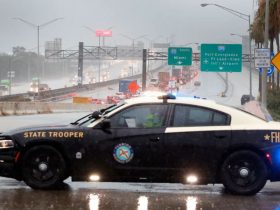Watches for hurricanes and tropical storms have been issued for portions of Florida as a storm system bringing heavy winds, rain, and coastal flooding approaches the western coast of the Sunshine State.
The tropical depression that is presently over Cuba is expected to intensify by late Saturday and become tropical storm Debby, according to forecasters. In addition, it would be the current hurricane season’s fourth named storm.
“Tropical Depression Four is expected to intensify into Tropical Storm Debby and could be near hurricane strength before landfall in Florida’s Big Bend region Sunday night or early Monday,” Weather.com stated.
The Associated Press reports that thunderstorms and gusty winds have already been reported in parts of southern Florida, the Florida Keys, and the Bahamas.
The storm is expected to bring dangerous rains, powerful gusts, and a “life threatening storm surge” to sections of Florida, especially the Gulf Coast and Tampa Bay area, the National Weather Service stated in its advisory.
Additionally, forecasters believe that the system will continue to be a tropical storm throughout next week, posing a threat to Georgia and the Carolinas. According to the AP, there is presently a tropical storm watch over the Dry Tortugas and Florida’s west coast, a hurricane watch over parts of the Big Bend region and Indian Pass in the panhandle.
Read Also: Minnesota’s Rent Crisis: A New Report Uncovers Housing Struggles
Some locals may associate the name Debby with a hurricane of the same name that occurred in 2012. According to the news wire, that storm resulted in over $250 million in damage as well as eight deaths, including seven in Florida alone.
Governor Ron DeSantis (R) of Florida stated earlier this week that his administration was keeping an eye on the storm system.
He posted on social networking platform X, saying, “Florida is monitoring Invest 97L in the Atlantic, which is expected to strengthen and potentially make landfall as early as this weekend. It will be slow-moving and bring lots of rain that could cause significant flooding.”












Leave a Reply